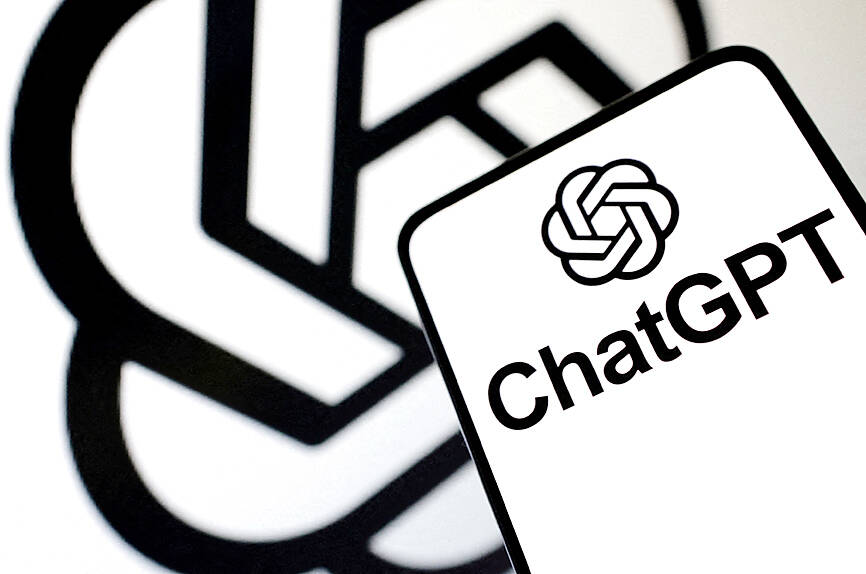Germany is joining other European nations in scrutinizing the use of personal data by the popular artificial intelligence (AI) chatbot ChatGPT and demanding answers from its US maker OpenAI, a regulator said on Monday.
Regional data protection authorities in Europe’s top economy have compiled a questionnaire for OpenAI and expect a response by June 11, said Marit Hansen, commissioner for the northern state of Schleswig-Holstein.
“We want to know if a data protection impact assessment has been carried out and if the data protection risks are under control,” Hansen said. “We are asking OpenAI for information on issues that stem from the European General Data Protection Regulation.”

Photo: Reuters
German authorities want to verify whether OpenAI under EU law sufficiently informs people whose data are used by ChatGPT that they “have rights, for example to access, correct or even delete their data,” she said.
It is also necessary to “clarify how these rights can be exercised,” she said, adding that regulators were particularly concerned about the processing of data relating to minors.
“As soon as personal data of European citizens is processed, European data protection law must be respected,” she said.
Italy last month temporarily banned the program over allegations its data-gathering broke privacy laws. It has since asked OpenAI to adjust its chatbot so it could be back online in the country at the end of this month.
France’s regulator earlier this month said that it had opened a formal procedure after receiving five complaints, while Spain’s AEPD data protection agency said it had opened an inquiry into the software and its US owner.
The EU’s central data regulator has formed a task force to help countries harmonize their policies and address privacy concerns.
Meanwhile, Cisco Systems Inc warned that AI software such as ChatGPT would make phishing attempts much harder to detect, requiring companies to adopt new defenses.
About 80 percent of illicit access into computer systems already comes via phishing, where hackers send e-mail or texts to people hoping to trick them into opening a malicious link.
AI tools can quickly customize those missives, luring more people into hackers’ schemes, said Jeetu Patel, the head of Cisco’s security and collaboration units.
“Attacks are going to get much more bespoke,” he said on Monday during a briefing in San Francisco, which is hosting the RSA Conference this week.
Until now, phishing e-mails have been relatively easy to spot because they are not tailored to individual recipients. They often have spelling mistakes and other giveaways. With the new generation of attacks, it would be harder to count on human users to spot the ruse, increasing the threat of network shutdowns and extortion attempts.
The solution is to rapidly sift through Internet traffic data and identify patterns that indicate something bad is about to happen or has just happened, Patel said.
Cisco sees this as an opportunity. The company, which leads the market for networking equipment, can use its position to analyze data flows, he said.
Additional reporting by Bloomberg

CHIP WAR: Tariffs on Taiwanese chips would prompt companies to move their factories, but not necessarily to the US, unleashing a ‘global cross-sector tariff war’ US President Donald Trump would “shoot himself in the foot” if he follows through on his recent pledge to impose higher tariffs on Taiwanese and other foreign semiconductors entering the US, analysts said. Trump’s plans to raise tariffs on chips manufactured in Taiwan to as high as 100 percent would backfire, macroeconomist Henry Wu (吳嘉隆) said. He would “shoot himself in the foot,” Wu said on Saturday, as such economic measures would lead Taiwanese chip suppliers to pass on additional costs to their US clients and consumers, and ultimately cause another wave of inflation. Trump has claimed that Taiwan took up to

A start-up in Mexico is trying to help get a handle on one coastal city’s plastic waste problem by converting it into gasoline, diesel and other fuels. With less than 10 percent of the world’s plastics being recycled, Petgas’ idea is that rather than letting discarded plastic become waste, it can become productive again as fuel. Petgas developed a machine in the port city of Boca del Rio that uses pyrolysis, a thermodynamic process that heats plastics in the absence of oxygen, breaking it down to produce gasoline, diesel, kerosene, paraffin and coke. Petgas chief technology officer Carlos Parraguirre Diaz said that in

Japan intends to closely monitor the impact on its currency of US President Donald Trump’s new tariffs and is worried about the international fallout from the trade imposts, Japanese Minister of Finance Katsunobu Kato said. “We need to carefully see how the exchange rate and other factors will be affected and what form US monetary policy will take in the future,” Kato said yesterday in an interview with Fuji Television. Japan is very concerned about how the tariffs might impact the global economy, he added. Kato spoke as nations and firms brace for potential repercussions after Trump unleashed the first salvo of

SUPPORT: The government said it would help firms deal with supply disruptions, after Trump signed orders imposing tariffs of 25 percent on imports from Canada and Mexico The government pledged to help companies with operations in Mexico, such as iPhone assembler Hon Hai Precision Industry Co (鴻海精密), also known as Foxconn Technology Group (富士康科技集團), shift production lines and investment if needed to deal with higher US tariffs. The Ministry of Economic Affairs yesterday announced measures to help local firms cope with the US tariff increases on Canada, Mexico, China and other potential areas. The ministry said that it would establish an investment and trade service center in the US to help Taiwanese firms assess the investment environment in different US states, plan supply chain relocation strategies and